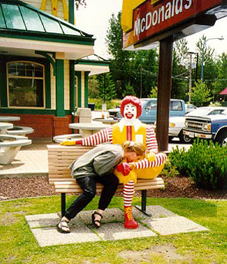
…well… oil, say one in ten 8-14 year olds according to a â??surveyâ?? by the British Heart Foundation. These survey results were launched at the same time as their new â??campaignâ?? aimed at children and highlighting what is really in fast food. We’ve somehow managed to get to a situation where the consumption of food is almost totally divorced from it’s origins and the wall of packaging and advertising that constitutes food branding is in part responsible for this. “What about the big shift in terms of supermarkets and food companies going out of their way to highlight the origins of their produce?” I hear you ask. As ever, the advertising industry can turn a negative into a positive, but if Sainsburies really think that I believe Jamie Oliver goes round rural Italy on his scooter checking on the pasta makers and tomato vines, they really are more deluded than I believed. These are the same supermarkets which reject potatoes for not being round enough and carrots with too much soil on them. If anyone was ever in denial about where food actually comes from…
As for fast food, and McDonalds constant struggle to sustain their brand, this seems to be getting more and more difficult, mainly due to the fact that the gap between reality and the image they try to portray seems bigger than ever. The strategy they are employing to cope with this is to broaden their range, so they can say to their detractors that they now sell salads, fruit, bagels etc. The problem is that they bring to these ‘healthy options’ exactly the same fast food mentality (heavily packaged pre-cut fruit, fatty high sugar dressings) which is the curse of their fries and burgers. A far smarter strategy would be to stick to a limited range and try to make it well. But even this would be a difficult option, as McDonalds has become such a pin-up for anti-capitalists, environmentalists and nutritionists to rail against, that any amount of improved behaviour will struggle to change the perception of their ‘brand’. The other option is that they turn a negative into a positive and really go for the ‘this is junk food but it tastes great’ angle, and lay into their detractors (of which I am one), as sanctimonious do-gooders with no sense of fun.
An essential part of their rehabilitation has to be a recognition that they don’t control their ‘brand’. Their brand is out there, and is as much what I say it is, as what they say it is. If you google McDonalds, half the first page is taken up with McD corporate sites and half with anti-McDonalds sites – these all constitute the McDonalds ‘brand’, not just the one’s that they author or control themselves.
The internet has enabled a whole new world of peer to peer recomendation (or condemnation) – the problem is that some organisations still think we are in a world where one-way marketing rules, and that a good image is down to putting out enough positive mass messages and sitting back to watch the cash roll in. Try googling your organisation and seeing how many hits are positive and how many are negative – far from scientific, but an interesting way of getting a feel for your ‘brand – position’.
One thought on “Chips are made from…”